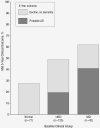Clinical prediction of Alzheimer disease dementia across the spectrum of mild cognitive impairment
- PMID: 18056553
- PMCID: PMC2581771
- DOI: 10.1001/archpsyc.64.12.1443
Clinical prediction of Alzheimer disease dementia across the spectrum of mild cognitive impairment
Abstract
Objective: To determine whether clinical assessment methods that grade the severity of impairments within the spectrum of mild cognitive impairment (MCI) can predict clinical course, particularly among very mildly impaired individuals who do not meet formal MCI criteria as implemented in clinical trials.
Design: Cohort.
Setting: Community volunteers.
Participants: From a longitudinal study of normal (Clinical Dementia Rating [CDR] = 0; n = 77) and mildly impaired (CDR = 0.5; n = 167) participants with 5 or more annual clinical assessments, baseline level of cognitive impairment in daily life was graded using CDR sum of boxes (CDR-SB) and level of cognitive performance impairment was graded using neuropsychological test scores.
Main outcome measures: Five-year outcome measures included (1) probable Alzheimer disease (AD) diagnosis and (2) clinical "decline" (CDR-SB increase > or = 1.0). Logistic regression models were used to assess the ability of baseline measures to predict outcomes in the full sample and separately in the subjects who did not meet formal MCI criteria as implemented in a multicenter clinical trial (n = 125; "very mild cognitive impairment" [vMCI]).
Results: The presence of both higher CDR-SB and lower verbal memory and executive function at baseline predicted greater likelihood of probable AD and decline. Five-year rates of probable AD and decline in vMCI (20%, AD; 49%, decline) were intermediate between normal participants (0%, AD; 28%, decline) and participants with MCI (41%, AD; 62%, decline). Within vMCI, likelihood of probable AD was predicted by higher CDR-SB and lower executive function.
Conclusions: Even in very mildly impaired individuals who do not meet strict MCI criteria as implemented in clinical trials, the degree of cognitive impairment in daily life and performance on neuropsychological testing predict likelihood of an AD diagnosis within 5 years. The clinical determination of relative severity of impairment along the spectrum of MCI may be valuable for trials of putative disease-modifying compounds, particularly as target populations are broadened to include less impaired individuals.
Figures

Similar articles
-
Mild cognitive impairment can be distinguished from Alzheimer disease and normal aging for clinical trials.Arch Neurol. 2004 Jan;61(1):59-66. doi: 10.1001/archneur.61.1.59. Arch Neurol. 2004. PMID: 14732621 Clinical Trial.
-
Neuropsychological prediction of conversion to Alzheimer disease in patients with mild cognitive impairment.Arch Gen Psychiatry. 2006 Aug;63(8):916-24. doi: 10.1001/archpsyc.63.8.916. Arch Gen Psychiatry. 2006. PMID: 16894068
-
Predicting the time to clinically worsening in mild cognitive impairment patients and its utility in clinical trial design by modeling a longitudinal clinical dementia rating sum of boxes from the ADNI database.J Alzheimers Dis. 2014;40(4):967-79. doi: 10.3233/JAD-132090. J Alzheimers Dis. 2014. PMID: 24531162
-
[Neuropsychological impairment in the early Alzheimer's disease].Encephale. 2007 May-Jun;33(3 Pt 1):310-6. doi: 10.1016/s0013-7006(07)92044-8. Encephale. 2007. PMID: 17675928 Review. French.
-
Neuropsychological features of mild cognitive impairment and preclinical Alzheimer's disease.Acta Neurol Scand Suppl. 2003;179:34-41. Acta Neurol Scand Suppl. 2003. PMID: 12603249 Review.
Cited by
-
Performance on the RI-48 Cued Recall Test Best Predicts Conversion to Dementia at the 5- and 10-Year Follow-Ups.Dement Geriatr Cogn Dis Extra. 2011 Jan;1(1):258-66. doi: 10.1159/000330097. Epub 2011 Aug 16. Dement Geriatr Cogn Dis Extra. 2011. PMID: 22163249 Free PMC article.
-
Event-Related Potentials Reveal Altered Executive Control Activity in Healthy Elderly With Subjective Memory Complaints.Front Hum Neurosci. 2018 Nov 14;12:445. doi: 10.3389/fnhum.2018.00445. eCollection 2018. Front Hum Neurosci. 2018. PMID: 30487741 Free PMC article.
-
Breadth and depth of working memory and executive function compromises in mild cognitive impairment and their relationships to frontal lobe morphometry and functional competence.Alzheimers Dement (Amst). 2019 Feb 22;11:170-179. doi: 10.1016/j.dadm.2018.12.010. eCollection 2019 Dec. Alzheimers Dement (Amst). 2019. PMID: 30911598 Free PMC article.
-
A highly predictive signature of cognition and brain atrophy for progression to Alzheimer's dementia.Gigascience. 2019 May 1;8(5):giz055. doi: 10.1093/gigascience/giz055. Gigascience. 2019. PMID: 31077314 Free PMC article.
-
Pilot Study of Second-Generation DNA Methylation Epigenetic Markers in Relation to Cognitive and Neuropsychiatric Symptoms in Older Adults.J Alzheimers Dis. 2023;93(4):1563-1575. doi: 10.3233/JAD-230093. J Alzheimers Dis. 2023. PMID: 37212116 Free PMC article. Clinical Trial.
References
-
- Lleó A, Greenberg SM, Growdon JH. Current pharmacotherapy for Alzheimer's disease. Annu Rev Med. 2006;57:513–533. - PubMed
-
- DeKosky ST, Marek K. Looking backward to move forward: early detection of neurodegenerative disorders. Science. 2003;302(5646):830–834. - PubMed
-
- Petersen RC, Smith GE, Waring SC, Ivnik RJ, Tangalos EG, Kokmen E. Mild cognitive impairment: clinical characterization and outcome. Arch Neurol. 1999;56(3):303–308. - PubMed
-
- Bennett DA, Schneider JA, Bienias JL, Evans DA, Wilson RS. Mild cognitive impairment is related to Alzheimer disease pathology and cerebral infarctions. Neurology. 2005;64(5):834–841. - PubMed
Publication types
MeSH terms
Grants and funding
LinkOut - more resources
Full Text Sources
Medical

